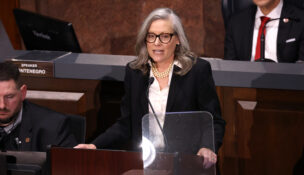Critics of utility measure urge veto if it lands on Hobbs’ desk
Reagan Priest Arizona Capitol Times//May 2, 2025//
Critics of utility measure urge veto if it lands on Hobbs’ desk
Reagan Priest Arizona Capitol Times//May 2, 2025//
Key Points:
- Bill would allow utility companies to move debt into low-interest bonds
- Critics say the process can be good, but lacks safeguards to protect residential utility customers
- Utility companies say it will save customers money in the long run
Democratic lawmakers, former members of the Arizona Corporation Commission and other advocates continue to sound alarm bells over a bill that would allow public utility companies to securitize assets as the possibility of significant amendments or a veto remains uncertain.
At a press conference on April 29, Democratic Sens. Priya Sundareshan and Lauren Kuby were joined by former commissioners Sandra Kennedy and Bob Burns in calling on Gov. Katie Hobbs to veto the controversial House Bill 2679. The bill allows utility companies to transfer debt into low-interest bonds that can be sold to recoup funding from aging or inefficient assets, such as old coal-fired power plants.
The bill has been a point of contention since its introduction in January, with Republicans and Democrats alike raising issues with its provisions. It also created tension between the Legislature and the Corporation Commission after commissioners said they were not consulted by Arizona Public Service or Rep. Gail Griffin, the drafter and sponsor of the bill, before it was filed.
Currently, the commission’s official position on the bill is neutral, even after it passed through amendments in the House. Critics say the bill lacks sufficient guardrails and oversight to ensure utility companies are not securitizing unsuccessful assets that rate payers are still footing the bill for.
Kennedy, a former Democratic commissioner, called the bill in its current form “a Ponzi scheme.”
“Older debts are paid off with new charges, yet locking rate payers into decades of payments without addressing the root causes of debt, while guaranteeing profits for the utility companies and Wall Street investors and leaving the distressed rate payers to pick up the tab,” Kennedy said at the April 29 press conference.
APS and Republicans have billed the proposal as a cost-saving measure for utility companies and rate payers while pushing it through the House, despite a letter from the all-Republican ACC detailing its concerns with it. The bill is currently awaiting amendments and final passage in the Senate before it can head to the governor’s desk.
Burns, a former Republican commissioner, urged lawmakers to hold the bill so that the ACC can conduct an evidentiary hearing and allow stakeholders to weigh in on the concept. He also called on Hobbs to veto the bill if it reached her desk.
“My ask would be for the governor to veto the bill with the provision that it be sent back to the ACC for evidentiary hearing and be refiled next session,” Burns said at the April 29 press conference. “The big point is, it needs to be thoroughly investigated with a very critical eye before it’s passed, with the potential to harm so many people that are relying on APS for their electrical services.”
Hobbs’ office declined to comment on the bill.
Sundareshan, the Democratic Senate minority leader, said she has communicated her problems with the bill to the Governor’s Office and told Hobbs’ staff that the bill would only be palatable if it limited securitization to retiring infrastructure and included a sunset provision, allowing lawmakers to review its use. She said APS rejected that proposal, but is working with Republicans on other amendments.
Many opponents of the bill say securitization can be a good thing, but that the current bill is unworkable, rushed and possibly even unconstitutional. Attorney General Kris Mayes, a former member of the Corporation Commission, sent a letter to lawmakers last month saying the legislation in its current form could interfere with the constitutionally prescribed duties of the ACC.
“To create the legal certainty required for securitization, the Bill necessarily infringes on the Commission’s exclusive, constitutional authority to set utility rates,” Mayes wrote.
That could put the state at risk of lawsuits if the bill is signed as currently written. And several Democrats are cosponsoring the bill, which could sway Hobbs to sign it.
Democratic Reps. Seth Blattman, Janeen Connolly, Alma Hernandez, Consuelo Hernandez, Lydia Hernandez, Myron Tsosie and Kevin Volk joined Sens. Flavio Bravo, Brian Fernandez and Catherine Miranda in signing on to the bill after it was introduced.
Sundareshan, an environmental attorney by trade, said she believes some of her fellow Democrats have not had time to read the 40-page bill and understand its complexities. She said she is working with lawmakers to change their votes.
“There was not a lot of transparency or stakeholder input,” Sundareshan said. “So I think what occurred was there was not a lot of time for those conversations to be had, these alarms to be raised when it went through the House the first time. So when it comes back to the Senate, we will absolutely be talking to our colleagues about the dangers it poses.”
For now, critics will have to wait and see whether amendments in the Senate will assuage their concerns or if they’ll have to take the fight to the Governor’s Office.


















